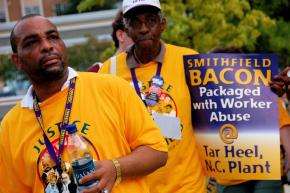Labor wins at Smithfield
reports on the UFCW's stirring victory in North Carolina after a grueling struggle.
IN A tremendous victory for everyone fighting for respect on the job in the South and throughout the country, workers at Smithfield Foods' Tar Heel, N.C., plant voted to join the United Food and Commercial Worker (UFCW).
According to the UFCW, the results of the December 10-11 election at the world's largest hog-killing plant was 2,041 to 1,879--a close vote, but a tremendous accomplishment in the face of management's all-out campaign against the union that defeated two previous elections.
Although union representatives were unable to speak with the press under conditions of an October legal settlement in which Smithfield agreed to drop a racketeering lawsuit against the union, there was little argument that this represented a historic moment for organizing in the anti-union South.
In the lead-up to the vote, union supporters wearing bright yellow T-shirts fanned out to round up a "yes" vote for the union. Now that the results are in, there are big expectations. Larry Murphy, a 38-year-old who has worked at the plant for a year and voted for the union, told the Virginian-Pilot. "We needed a voice to stand up for us. There need to be changes there."

Aleisha Rascoe talked to her fellow workers about the union every morning over the past two years and distributed literature. "It's not all about the money," she told the Fayetteville Observer. "It's about having a voice." She added, "If we can change the White House, we can change the hog house. And we did, we made history all in the same year."
Mattie Fulcher, who works in the plant's livestock section, was an election observer. She told the Observer. "I can't say that anyone cheated. This was one election that came out the way it was supposed to have come out...We are able to speak now. We will be treated fairly. A lot of people haven't been treated fairly."
She added, "We have worked hard for this, and we did it, and we can continue to do it. All I want is everybody to be together, and not fight against each other. As long as we do that, we can make it."
WORKERS AT the Smithfield plant fought hard and long for union representation. Two previous elections exposed the intransigence of this company. In the 1994 and 1997 votes, Smithfield management violated labor law by firing and spying on union supporters; threatening job losses and cuts in wages and benefits if workers chose a union; harassing and intimidating union supporters; and conspiring with the local sheriff's department to physically intimidate and assault union supporters.
But workers refused to give up and upped the ante in 2006, with an aggressive public campaign to gain support for their struggle--targeting Smithfield's record of harassment and unsafe working conditions. The Justice at Smithfield campaign brought to light the dangerous and sometimes deadly realities at Tar Heel.
For instance, a 2005 Human Rights Watch Report described the 2003 case of 25-year-old Glen Birdsong, who died when he was overcome by fumes inside at the plant:
"They didn't tell him about the dangers, and they didn't give him a safety belt to get pulled out of there in case he fell in," coworkers told Human Rights Watch.
On March 10, 2004, the North Carolina Division of Occupational Safety and Health, which is authorized under OSHA "state plan" provisions to administer the federal safety law, cited Smithfield for a "serious" violation...On April 19, the state agency fined the company $4,323 for the violation. The fine was reduced after applying a 25 percent discount for the company's "basic" health and safety program and a 10 percent discount for "minimal employer disruption" of the state's inspection of the site of Birdsong's death.
When they moved this huge plant to rural Tar Heel--where there are few opportunities for employment at decent wages, and unions are scarce--Smithfield officials thought that they could get by with murder. The results of last week's vote proves that they were wrong.
The yes vote at Smithfield also represents a victory for the struggle for the rights of immigrant workers on the job. Union supporters worked hard to cut against the racism the company tried to foster among the diverse workforce, which includes many immigrants who Smithfield thought it could intimidate and abuse.
When the company fired dozens of immigrant workers for allegedly not having proper Social Security documentation in November 2006, some 1,000 workers walked off the job in a two-day wildcat. The company retaliated a few months later, and Immigration and Customs Enforcement agents raided the plant--arresting 21 workers and terrorizing the rest of the workforce. The day after, hundreds of workers skipped work in protest.
Ultimately, though, Smithfield workers could not be silenced.
The next step for UFCW members is negotiating a good contract at Smithfield. This will be no simple task, but what last week's victory shows is that, up against a united, determined and involved workforce, the company won't be able to get by with what it has in the past.
In the coming months as well, the proposed Employee Free Choice Act (EFCA) is supposed to come before Congress. It would go a long way toward making the right to organize easier for millions of workers. Labor activists will have to take momentum from this victory in North Carolina and organize pressure to make sure it becomes law.
Some critics of EFCA cynically argue that Smithfield is an example of why workers don't need the law, since the union won in the end.
The opposite could not be truer. Smithfield workers should never have had to endure the 16 years of grueling battles with management, the arrests and firings, the deportations--and the hundreds of workers maimed or killed on the job in the meanwhile.
Smithfield demonstrates that workers' determination and unity can win--but also why it's critical, especially during difficult economic times, to fight for workers' right to organize.


